This is my original home page, created in 1994. If you want more goodies, they're at my professional home page, here.
Outside the Light-Cone
This is my original home page, created in 1994. If you want more goodies, they're at my professional home page, here.
Outside the Light-Cone
Confused? Here's an extensive
interview with me that may help you to understand where I'm coming from.
And here's another, long interview about my
spiritual beliefs and practices.
Here one of my friends has taken a a morph of my face a bit too far. But it is rather funny...
I run a mailing list - Yeschaton
- which keeps track of cutting-edge trends in the sciences.
Here's a link
to the Yeschaton website. (Kudos to James Kent & TRiP)
Enjoy!
Mark Domenic Amadeo Tripp Pesce
McBurners
An essay about the future of Burning
Man
For the first time in nine years, I skipped Burning Man in 2003. What I gained from that decision was an unexpected clarity of vision - about myself, the event, and its future. On Thursday 4 September 2003 I gave a brief spoken-word rant at Invisible College. That rant, in essay form, was sent out as a public letter to the entire Burning Man community the following evening.
It's time for us to rethink, revisit and revise all of our dearly-held beliefs about Burning Man. That's my opinion, anyway. Let's start up a discussion, and together, define where we want to be heading. We're in the driver's seat - and it's long past time we put the petal to the metal...
Comments? Critiques? Email me.
"Crazy Noise"
Performed at the Invisible
College
21 August 2003
A twenty-five minute spoken-word piece - with background music by the 21st
Century Collective - wherein I tell stories of two of my crazy friends, two
weeks of crazy times on Friendster,
and what this all has to do with life...
This is a 30MB MP3 file (160Kbps encoding),
so be careful when you click on the link. You may want to save it to your hard
disk first, then play it back at your leisure.
If you're on a dial-up connection, you may want this low-quality (32Kbps encoding) version...
Unbomb
Video Artwork
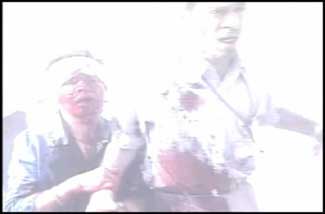
On 21 August 2003, the UN HQ in Baghdad was bombed by unknown assailants. A
CBS cameraman was in the room as it happened, and kept shooting through all
the horror and chaos. This video was later posted on truthout.org. That evening,
as I watched it, I heard the strains of Tomaso Albioni's "Adagio"
running through my mind. I set this piece - sans its soundtrack - to Albioni's
music. The effect, people have told me, is both chilling and strangely beautiful.
It reminds me of the fragments of film that William Gibson wrote about in Pattern
Recognition.
This film is now available on YouTube. Click here to watch it.
"Year
of Jubilee"
Performed at Mindstates Jamaica
6 October 2002
This is a piece of experimental fiction, in which I attempt to present an insider's
view of the last few moments before the Eschaton. The astute reader will note
how much lifted from Homer & Joyce's "Ulysses".
For those of you who wish to hear the piece, as I read it aloud, here's
a link to an MP3 file (8.6MB).
Delivered at the
Students for a Sensible Drug
Policy / Marijuana Policy
Project
Joint Conference
9 November 2002
Our nation's drug laws are worse than draconian - they're a disgrace.
This nation, which prides itself on freedom of speech, hasn't yet grasped the
connection between freedom of speech and freedom of thought. But that connection
will be made, sooner or later. That's when it will become frighteningly obvious
that the battleground of the 21st century is for control of what you think,
and how you're allowed to think it.
In this talk I take a very public stand, a "coming out," wherein I
do say that I do use certain drugs which are currently deemed illegal. It is
important that the twenty or thirty million Americans who believe as I do step
forward, together, and show the country that we're responsible, reasonable,
and utterly firm in our resolve to be true to what we believe. If we do that,
the drug laws and the culture of fear they've engendered will fade away like
morning mist.
Delivered at MINDSTATES
Jamaica
3 October 2002
A quarter of a century ago, Terence & Dennis McKenna published The Invisible Landscape: Mind, Hallucinogens and the I Ching, a revolutionary book which attempted to provide a physical framework for the understanding of time, based upon both Terence McKenna's studies of Alfred North Whitehead's Process and Reality, and his intuitions of a resonant theory of time, reflected in the ancient Chinese oracular system.
Although the book was reguarded as a high point in psychedelic thinking, it has been ignored through most of the years that have followed. Most people thought the premise too ridiculous even to refute. I've always felt that the McKennas' argument held a grain of truth, and this talk - delivered at a conference about the state of psychedelic culture, circa 2002 - is my own exploration of the ideas contained within The Invisible Landscape.
Where once the Eschaton seemed a concept fit only for psychotics, today respected scientists talk about the Singularity as a matter of course. These ideas are, in essence, identical, and a framework of cultural anthropology can be employed to bring both words into a common discourse about how the physical processes of the universe have become increasingly lingusitically pliable, and point toward a thorough transformation of reality.
Becoming Transhuman
A Feature-length film about the Impending
End of Everything
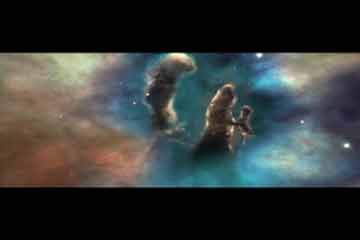
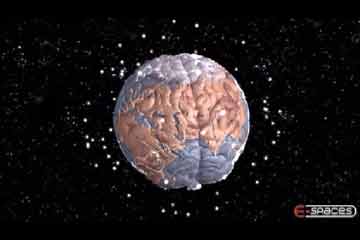
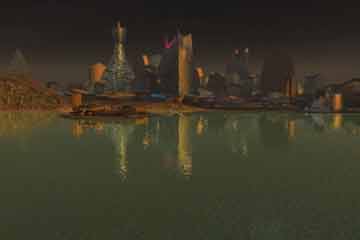
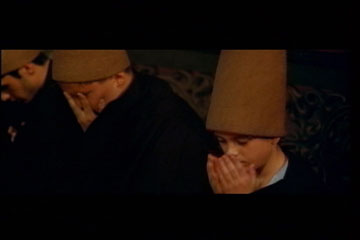
Produced for the MINDSTATES II Conference in Berkeley, California, "Becoming Transhuman" uses appropriated sound and video images (artistic fair use, in multiple and flagrant violations of the Digital Millennium Copyright Act) to create a new work which expresses itself in three parts, corresponding to the natural trinity of Affirming, Denying & Resolving. Who are we? Where are we going? What will we become? There are no easy answers to these questions, but "Becoming Transhuman" represents my own deeply-held beliefs on the future of humanity. To watch the video, you'll need to have a BitTorrent client installed. Click here to get one.
To get the torrent file of Becoming Transhuman , click here.
If you'd like to read the narration which accompanies film, here's the PDF file. It requires Adobe Acrobat.
Xbox
1,000,000,000,000 Operations per Second
Here's a brief article written for WIRED magazine (May 2001) about Microsoft's forthcoming video gaming console, the Xbox, which uses a new graphics chip designed by silicon upstart nVidia, and which claims a trillion operations per second. Here's a peek behind the hype...
The Playful
World:
How Technology is Transforming our Imagination
Ballantine Books, Now Available!
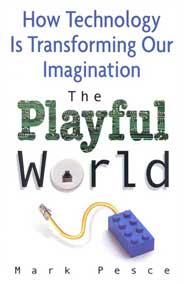
From the Introduction:
"When a child enters the world, it knows nearly nothing of the universe beyond itself. With mouth, then eyes, and finally, hands, it reaches out to discover the character of the surrounding world. Over the course of time, that child will discover its Mother - the source of life - and, sometime later, its Father. But in the first days after birth, the child will be presented with rattles, mobiles, mirrors and noisy stuffed animals that will become its constant companions. Our children, in nearly every imaginable situation, are accompanied by toys...
"Just as the creative world of children has become manipulable, programmable and mutable, the entire fabric of the material world seems poised on the edge of a similar transformation. That, at essence, is the theme of this book, because where our children are already going, we look to follow."
The Playful World is a "web-enhanced" book. Just drop by, www.playfulworld.com, to find a depth of additional resources such as research materials, links, articles and additional essays by the author.
I made a short promotional film for the Ballantine sales department, which gives some background on The Playful World. If you'd like to play it, click here. (If you have ISDN, DSL or faster, try clicking here.)
You can order the book from Amazon, Borders or Barnes & Noble. Just click on your favorite store!
Toys and the Playful World
Keynote address for Women
in Toys
14 February 2001
This talk was delivered to a professional organization of executives and designers working in the toy industry - most of whom were women. During the talk I did my best to project how today's interactive toys could become the foundation for a much more expressive world of interactive play.
Technopagans at the
End of History
Lecture series at Esalen
with Terence McKenna
Recorded in August 1998, the full 9 hours of lectures have been encoded to MP3 format. If you listen all the way through to the end (or just jump to tape 12) you can hear me claim that the Internet doesn't really exist.
Living Language
Article for FEED
Early in 2001, the Gene Expression Markup Langauge, or GEML was introduced to the world. It provides a standard for geneticists - and their supercomputers - to talk about gene sequences. The hope is that this can speed progress in identifying the constituent genes within our geneome, and serve as a "living" language.
Birth
of a Station
Article for FEED
A brief article about the release of Sony's ground-breaking Playstation2 video game console, which is really more like a living-room supercomputer.
Meet
"Big Brother"
Article for Salon
One of my students at USC - recently graduated - went to work on the production set of CBS's "Big Brother" television show. He told me an amazing story of how much work it takes to create a panopticon for television, and spoke of the incredible work by the show's senior story producer, Robert Caplain. I went to visit them at CBS' Studio City lot, and spent a very interesting day watching the people who create "Big Brother".
The
Real World
Presentation at PLANETWORK
One of my own ideas - freely ripped off from Bucky Fuller - is the creation of a real-time Earth visualization and comprehensive planning tool. I've created an early version of this, known as WebEarth. With the introduction of cheap graphics supercomputers, such as Sony's Playstation2, we can transform the globe on every teacher's desk into a globally accessible and tangibly sensible source of information about the world around us. These are the HTML slides used in the talk.
If this idea intrigues you, participate in the ongoing discussion
at Cafe
Utne.
There is some chance that this will become a real project - so if you're interested,
please do contact me.
presented at
Computer and Video Games Come of Age
Massachusetts Institute of Technology
11 February 2000
"Computer and Video Games Come of Age" featured a wide range of speakers from the videogame industry, talking about the various aspects of their artforms. A gathering of the elite to talk about the need for a more methodical approach to th common craft. I gave the closing talk, a short-form rant about some of the future possibilities for games - both hopeful and cynical.
A Feed Daily Report
NAPSTER is about the most important technology to show up on the network desktop since the World Wide Web. It also spells doom for most carefully held copyrights. This is a Feed Daily from 10 February 2000 in which I discuss the esoteric importance of this singular app.
A Feed Special Report
A "review" of Quake 3 Arena, one of the most realistic - and bloodiest video games ever created.
The Magic Mirror:
Science Fiction as a Software Development Platform
Paper delivered at the inaugural conference for MIT's Comparitive Media Studies program. Explores the evolving relationship between science fiction (particularly cyberpunk) and the "big" projects of software development in the late 20th century.
A talk delivered at Brown University's "Virtual Y2K" conference, in December 1999, reflecting on the implications of meme theory and communications technology. Dedicated to my friend Doug Rushkoff.
An article for FEED magazine on Nanotechnology. Summarizes recent work in the field, and talks quite honestly about the "gray goo" problem.
Keynote address at SCOPE1: Information vs. Meaning
This talk - among the most significant (in my own opinion) - that I have ever done, encapsulates, in poetic language, my feeling about the present arrow of technological development, and the implications for human ontology.
A short and rather dense talk about the eschaton, the Omega, and Teilhard, delivered at PARADOX II, at Arcosanti, on 25 September 1999. I spent most of the panel where I delivered the talk, hidden behind the ".com" issue of TIME magazine.
I spent Yuletide 1998 on the big island of Hawai'i; it was a transformative experience, which, in many ways, set the stage for everything that will follow in the next few years. After the trip - and its associated revelations - I composed a number of essays, collectively known as "The Future of Magic". They all have common themes, but each speaks with a different voice.
From "Low Earth Orbit":
I am an Eschatologist. By this, I mean to say that I study the way the Earth is coming to an end, a final culmination and consummation of the grand experiment of life. The meteorologist studies the weather, but the eschatologist studies which way the wind is blowing. The Grand Catastrophe, the twin bookend to the Big Bang, is coming. I argue that itís coming rapidly, certainly within the lifetime of most of the people alive on Earth today. This scares my friends, because they think that an End is equivalent to Death. But birth is the eschatological event of conception, and, seen in this light, an end does not have to be a nullifying event; it could, just as easily, be an unconditional liberation.
Here's a RealVideo webcast of a talk I gave - "The Archer" - at The Next Twenty Years lecture series, in Seattle, Washington, on 27 August 1998. The panelists included venture capitalist Ann Winblad - who had some very interesting things to say about the future of business, and Dr. Ralph Merkle, a nanotechnology pioneer and one of my personal heroes. During the Q & A period that followed our 10-minute talks, the audience made some pretty interesting statements.
Click here to view
the 28.8 Kbps presentation, or
Click here to view
the 56 Kbps presentation.
Paper on theology and media prepared for the Science and the Spiritual Quest program of the Center for Theology and the Natural Sciences at the Graduate Theological Union, University of California.
"We, who eat our heroes, who cast about like crack-fiends for the slanderous tales of those we have never met, astride the threshold of another way of being, half the Oedipal wreck of passion, but closer still to the Omega of Infinite Compassion - stand divided, connected, and overwhelmed by forces unleashed but only dimly understood."What hath God wrought?"
"The cell is the universe within, and Mother Gaia the universe without. And who among us can draw the line that separates these two? We breathe, we grow, and spread our vitality up to the very edges of the stars, both within our self-created world of ones and nones, and outside, to the smiling eyes of all the ones who you will touch, and remain part of, forever."
If ever I got information from somewhere else (the "channel Channel"?), this was the time. The place: The Pacific Film Archive at the University of California. It's not quite a poem, but not quite prose, either. Here's an introduction that you might want to read before you dive in.

Capstone Address to the IEEE Visualization Conference in Phoenix, on 24 October 1997. From the abstract:
Johannes Kepler had a devil of a time trying to discern the laws of planetary motion from the observed movements of the heavenly bodies. He spent months - perhaps years, trying to divine the circles which could contain their motions. From Pythagoras to Kepler, our visualization of the "perfect" forms of circle and sphere constrained the development of science far more than they aided it; when Kepler discovered the ellipsoid- and Newton wrote an equation to describe it - they laid down the fundamental mechanism of scientific discovery, in it an endless two-step of visualization and codification.
What we observe becomes scientific law; what we can see becomes true. The old proverb goes, "Seeing is believing," but somewhere along the way "seeing" has become confused with "visualizing", leading researchers in directions conditioned more by preconceived notions of underlying reality than any foundation of phenomena.
"The birth of language in the Paleolithic era - simultaneous with and incontestably linked to the birth of consciousness - created stresses upon the human organism which had never before been encountered. This speed-up, an exteriorization of thought which placed the internal self into the minds of the community of the newly conscious, led directly to an ingression of imagination; simulation begins as mythology.""The gate between the historical self and post-historical post-humanity, the passage between a particular island of factuality and the absolute subjective, is ritual. Now we enter our closets and bend ourselves to the dictates of fashion and gender, language and culture. Soon, we cast magic circles in sacred groves, speak the Word, and bend the World to our ends. The ego can not survive this burst of power, any more than the animal survived the flash of consciousness; what follows us we can now hear, but we can not speak of it."
"There is no more ground beneath our feet; semantic singularity has taken the entire universe of meaning, and, in an in-folding worthy of a galactic black hole, compressed it into a cloud of energy, yielding nothing but the light bulb's steady and eternal yes. Everything is true. Everything is permissible. And this no longer just the mutterings of the alchemist, but the ontological dwell-state which post-Industrial civilization careens ever nearer towards, an attractor with its own peculiar form, a teleological arc in fractal form which as it unwinds brings mens infinitely closer to manus, the event horizon that ultimate meeting of logos and techne, the word and the world."
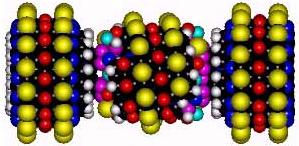
"The Metaphysic of Technology is the being of doing."
The March 1997 issue of the Journal is a special issue on the theme of the "Metaphysics of Technology". This short essay - a clarification of some of the points covered in Ignition, disusses the relationship between being (Ontos) and doing (Techne).
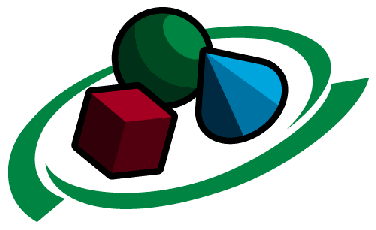
A first person report of the politics inside VRML. Learn the bloody truth of the birth of an Internet standard. The forces of commerce and community come into conflict where ever a new medium comes into being - but at what cost to the Consortium?
Ignition was delivered at World Movers, in January 1997, a ZD-sponsored conference all about VRML. I was asked to give the capstone address, which I did. It was a big turning point in my life; I realized that VRML had been created three years before (21 net-years) and so the talk reflected my position as the proud parent sending my child (VRML) off into an uncertain world, but with the best words of wisdom I could supply.
Many folks feel this is the best talk I've given, and one of the best they've ever heard. I'm touched.
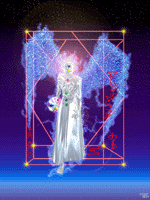
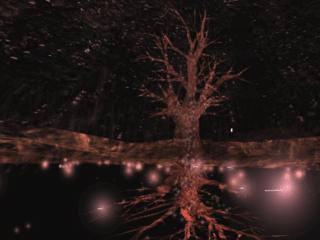

Presentation for 5CyberConf
The Noosphere, predicted by Teilhard de Chardin three generations ago, and long sought as the philosopher's stone of the information age, can now be said to exist. The phenomena which accompanied the formation of this super-human body are in themselves singular, and put together define a shape which is utterly unambiguous in its form - even though that form can not be seen in its entirety. Somehow it had not occurred to us that all of our connecting might produce phenomena beyond the expected - that our mediations might surprise ourselves with a display of great novelty. We now live in the midst of that novelty; what do we know of it?
This work - my major "academic" effort for 1996 - presents a partial inventory of some of the effects associated with the noosphere, and addresses questions questions raided in my earlier work, Final Amputation: Pathogenic Ontology in Cyberspace.
Microsoft PowerPoint slides (3.5 MB, zipped) from the presentation are also available.
Panel Presentations from SIGGRAPH '96
These talks originiated out of a life-changing experience which is described in the First Degree.
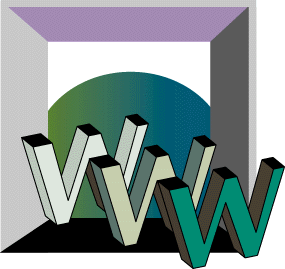
Text of my speech given at the Fifth International World Wide Web Conference in Paris on 8 May 1996.
There's also my column on ZDNet.
If, as Picasso suggests, great artists steal, we'll need a body of work which articulates the sacred. This work attempts to identify the qualities that underly the sacred aesthetic elecronic.

This paper establishes a theme in my own work which will be a major focus of my efforts through 1996; that is, the creation and maintainence of a global infrastructure for global imaging and global imagining. Using T_Vision as a starting point, what can we do to bring the planet to the desktop?
This piece is companion to Opening The Third Ear: Humanity at the VERGE of Communion, which I delivered on the same date one year before.
Performance given on 21 September 1994 at The Exploratorium in San Francisco, as part of the Bay Area Virtual Reality Special Interest Gruop (VERGE). This performance is divided into three main areas, identified by elements:
Paper presented at the First International Conference on the World Wide Web, in Geneva, Switzerland, 25-27 May 1994.
This work describes a visualization tool for WWW, "Labyrinth", which uses WWW and a newly defined protocol, Cyberspace Protocol (CP) to visualize and maintain a uniform definition of objects, scene arragement, and spatio-location, which is consistent across all of Internet. Several technologies have been invented to handle the scaling problems associated with widely-shared spaces, including a distributed server methodology for resolving spatial requests. A new languague, Virtual Reality Markup Language (VRML) is introduced as a first-pass proposal for WWW visualization needs.
HTML version can be viewed with a WWW viewer such as Mosaic or lynx. Also available are RTF (rich text format, which can be read by almost ANY word processor, save to local disk) and text-only versions.
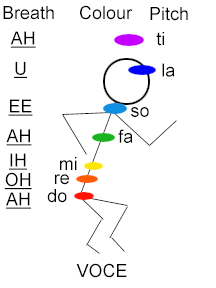
VOCE is evolving as a spontaneous international "membership by consciousness". Artists, writers, entrepreneurs, healers, and others are converging via word-of-mouth toward a common ground, all taking part in growing a collective "tree of voices" - and fun.
VOCE has been evolving as performance workshops where individuals go through a simple process of introspection and expression. Traditional and modern composing techiques are used to open the individual voice, access self-knowledge, and sing the "inner song".
The VOCE core focus is to bring its empowering processes to neglected parts of our communities: hospitals, prisons, schools. Recent workshops have begun with South Central LA teens, helping these youths to discover their own song.
The VOCE network has neither a commercial agenda nor leadership. Rather, all those involved are actively taking responsibity for what needs to be done to spread its benefits. All have a chance to give and take charge. VOCE continues to branch out on its own across the river of imagination. It is a common ground waiting for your interest, your ideas, your story, your initiative.
For more information call (213) 221-VOCE, or send us mail.

Collaboration between myself, Paul Godwin and Phil Harrington, to develop a software package which enables world-wide audio conference spaces to be created and spatio-located. Dr. Martens is a 3D audio expert now working at Headspace. We'll be developping interfaces which will allow people to put their ears "inside" Internet, so that they can hear sound, spatio-located to their position on the planet. We hope to lead several VOCE events within this aural space, which we believe will be quite magical events. Indeed, we believe it will be possible to hear and participate in the "song of the world."
Contact Mark Pesce, Paul Godwin or Phil Harrington for more information.
Artwork by Dimensional Graphics
Virtual Reality, especially in its evocation as cyberspace, the realm of holosthetic communication, is the nuclear weapon of the human mind. This paper proposes a framework for understanding the effects of immersion within holosthetic media, a framework which can be summed up in the following phrase: The creation of a world necessarily implies the creation of a world view.
This work was presented at the Third International Conference on Cyberspace, at the University of Texas at Austin, on 14 May 1993. It caused a bit of a stir at the conference, and led to an open discussion of vivogenics. This edition has a new prologue, written in April 1994, for its publication in _SPEED_: An Electronic Journal of Technology, Media, and Society.
This is one of the works that I am most happy with.
A poem I wrote at Winter Solstice 1993, concerning the self-awareness of Internet. Section 4, "Shape", really needs to be performed live with a chorus of VOCE chanting as accompaniment, to get the full effect. Call this poem an early, hermetic statement about the Worldsong.
Short piece written for Unshaved Truths.
Really ought to be
subtitled, "Or How I Learned to Quit Worrying and Love Cerwiddwen."
My first published piece, professionally, appearing in FringeWare Review #2.
Freedom in Cyberspace and why it's important and how we might find it. In this I argue that crypography is the defense industry of the 21st century, and, by inference, that the cypherpunks should be considered the heroes that they are. It was my research into telepathology, discussed at length in "Final Amputation", that led me to write this piece.
The abstract (unaccepted) for this year's CyberConf. Oh well. A brief discussion of the underpinnings of Cyberspace Protcol.
"Distributed Behaviors in Distributed Simulations", a talk I gave at the VR Systems Conference in New York City in October of 1993.
Abstract (accepted) for the Home-Oriented Informatics Conference, discussing the technical and social requirements for systems which broaden the political base.
Text of a presentation given at the Bay Area Virtual Reality Special Interest Group, VERGE, about "teledildonics", that is, VR and sex. I illustrated the point to come to some interesting conclusions, which I discussed, in more detail, in "Final Amputation".
First article in WiReD, "VR Hurts", about the dangers of Head-mounted Displays...
Second article in WiReD, "Sharing Cyberspace", a product review of the VRex VR-1000 3D projection display technology. For the "Street Cred" column.
Third article in WiReD, "SimSwim", about the CyberFin Dolphin Swim Simulator, the finest example of VR I've yet seen.